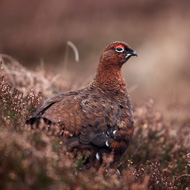Petition on grouse shooting ban reaches 100,000 signatures

Concerns about the illegal killing of birds of prey on shooting estates has led to increasing pressure to introduce further regulation.
A total ban on driven grouse shooting could be debated in parliament after a petition has reached more than 100,000 signatures.
Support for the e-petition, which was launched by Dr Mark Avery, surged around the 'Glorious Twelfth' (12 August) which marks the start of the grouse shooting season.
Pressure to introduce further regulation of grouse shooting has been rising in recent months amid concerns about the illegal killing of birds of prey on shooting estates. Just last week, RSPB Scotland announced the disappearance of eight golden eagles in less than five years. It is thought they may have been illegally killed and their satellite tags destroyed.
TV presenter and naturalist Chris Packham, who backed the petition, said: "In the end you can't argue with science, you can't argue with evidence, you can't argue with the truth. And the truth is that people are fed up with this 'tradition', the injustice and the lies."
Mark McCormick, head of campaigns for the League Against Cruel Sports, added: "It's high time a light was shone on the negative impacts of driven grouse shooting. We know that a parliamentary debate isn't guaranteed, but the amount of public concern, the number of experts speaking against grouse shooting and the growing evidence of wildlife persecution surely means that a fair debate must be held as a matter of urgency."
Last week, former cricketer Sir Ian Botham accused Mr Packham of being "an extremist" and using his position on the BBC as a platform for airing his views on grouse shooting.
As the pair went head to head on Radio 4, Sir Botham said: "Why is it okay for a BBC countryside presenter like Chris to be such an extremist while keeping his prominent role in the BBC and using it as a vehicle."
Responding to the claims, Mr Packham said: "I'm not an extremist… I'm a conservationist plain and simple. I'm not motivated by class or by politics or by anything else. I'm motivated by a very clear concern for the ecology of our country, the management of our uplands and the health of our bird population."
Speaking on the side of grouse shooting, Sir Botham argued that grouse moors are the most successful areas for breeding ground birds, citing a survey that found 800 pairs of lapwing and 400 pairs of curlew on one grouse moor. The figures were attributed to the British Trust for Ornithology, who have since issued a statement to say they did not carry out the survey.
"These figures have been attributed to the British Trust for Ornithology (BTO), but this claim is erroneous. This fieldwork was not carried out by the BTO and did not use the rigorous statistical methods employed by BTO in order to produce accurate estimates of this type. The organisation wishes to make it clear that the quoted figures should not be attributed to the BTO."



 The Veterinary Medicines Directorate (VMD) is inviting applications from veterinary students to attend a one-week extramural studies (EMS) placement in July 2026.
The Veterinary Medicines Directorate (VMD) is inviting applications from veterinary students to attend a one-week extramural studies (EMS) placement in July 2026.